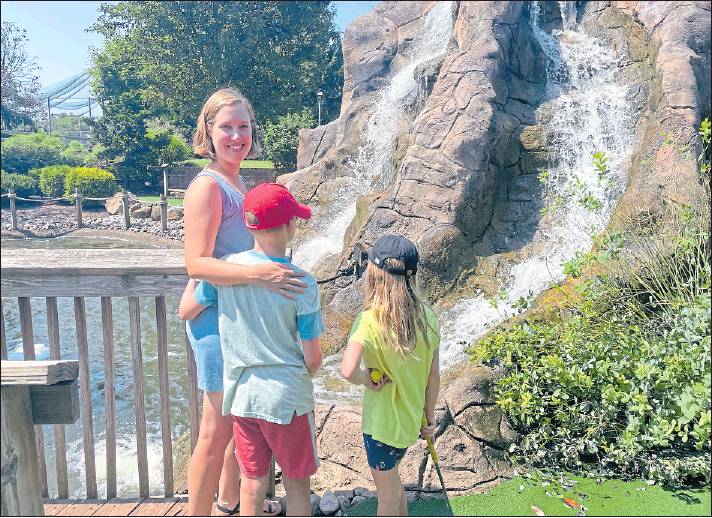OP-ED
Is this safe for my kids?
Words of advice on COVID parenting fatigue from a mom and pediatrician who is just as exhausted as you are.
By Katie Lockwood
The back-to-school season often sneaks up on me as I make the annual transformation from fun, laissez-faire summertime parent to organized mission command center parent required by school forms and calendars. Yet each year I make that transition and send our smiling, sun-drenched children into their new school year, while celebrating a return to structure and earlier bedtimes.
But in the 2021 back-to-school season, I am already tired. And as a pediatrician, I know I’m not alone.
For the last 18 months, parents have repeatedly asked ourselves: Is this safe for my kids? We have a complicated mental algorithm that we run all decisions through, and the mental gymnastics is exhausting our decision-making capacity. Things like school, sports, and play dates used to be a simple yes or no, but now involve an intricate rule system that factors in social distancing, masks, venue, and immunization status. The decisions are both plentiful and heavy, leading to slow-churning decision-making apparatus and increasing self-doubt.
As a parent of two children, I find 2021’s decision-making tree makes me long for the days when my big decision was likely to be which supplies to choose from the cornucopia of pencils, highlighters, and three-ring binders in the back-to-school aisle. As we prepare for the return to school, suddenly arguing with my second grader about which lunch box she wants is a welcome reprieve from making decisions about how to prevent her from contracting a potentially life-threatening disease.
Each time our children are presented with an opportunity in the time of COVID-19, it brings with it a calculation of risk and benefit. Grandparents, sick family members, and pregnancy add risks balanced by our need for social connection and community, which makes the algebra of pandemic parenting feel unsolvable.
I believe there are solutions that allow us to enjoy these times with our family, but we are going to have to be easier on ourselves.
The challenge with these constant calculations is that we are not actuaries or epidemiologists; we are parents trying to give our children the best life possible while keeping them safe. The recurring decision of
Is this safe? is complicated by ever-evolving guidelines from the CDC, FDA, and local government, which require parents to stay vigilant and decide for ourselves when given suggestions rather than rules. COVID-19 itself keeps changing too, which means that the decisions that felt right in March felt restrictive in July and will be different again in October. All of this relearning leaves us questioning our past decisions, and hoping we are well-informed enough to make the decisions ahead.
In my work as a pediatrician, the concern I hear most from parents is: What if I make the wrong choice? Parents blame ourselves, especially when our children get sick. It is easy to find fault, and in analyzing our errors, subsequent decisions bear more weight. While we hope that decisions will become easier over time, the last 18 months have not shown that to be true.
To fend off this decision-fatigue, try to minimize the number of decisions you need to make. I have done that by simplifying our routines — narrowing our outfit options, keeping a consistent lunch menu — knowing that this will minimize my cognitive load overall. This is an opportunity to build organizational habits that streamline your family routines.
I have also tried to minimize background noise bombarding me with information. For every decision, you can find millions of sources with contradictory information. I decided which sources I trust and have stuck with them for gathering new decision-making data: the Policy-Lab at Children’s Hospital of Philadelphia, CDC, and American Academy of Pediatrics.
Our family has also cut down on decisions by choosing inherently safe activities. Rather than deciding each month whether an activity is appropriate, we commit to outdoor things that we have felt safe doing throughout the pandemic. When a child chooses a riskier activity where the rules may change, we maintain consistency by adhering to the safest approach. For example, my daughter does gymnastics. While the gym’s rules have varied on mask-wearing, she has always worn her mask. This not only makes her feel safer but also removes the decision-making element as the policies change.
As a pediatrician, I also cannot overemphasize the decisionmaking freedom that has come with being immunized. Getting the COVID vaccine significantly reduces my chance of serious illness or death, which means I have to make fewer decisions about whom I can be around and what we can do. I look forward to giving my children the opportunity for that freedom as well, when they are eligible.
And importantly: I validate my feelings. This pandemic is hard, and the decision-making burden is just one of many things contributing to parental fatigue. Whether big or small, almost every decision feels substantial during the COVID pandemic, and parents are eager to return to the mundane, safe choices of the past. After counseling many parents in my office, I see how universal this feeling is and how as parents, we are all trying to do what is best for our children in uncertain times.
Katie Lockwood, M.D., ME.d., is a primary care pediatrician at Children’s Hospital of Philadelphia, host of the ”Primary Care Perspectives” podcast, and the parent of two elementary school children.
